They Got Caught Cheating at a Coldplay Concert - What Psychology Says About Why People Cheat
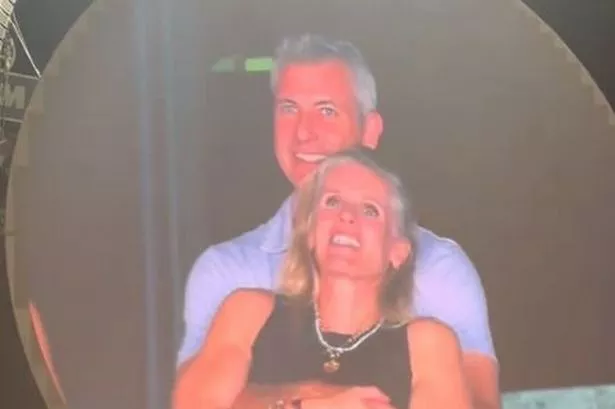
They Got Caught Cheating at a Coldplay Concert - What Psychology Says About Why People Cheat
It was supposed to be a chill night out. Coldplay fans packed the stadium. Lights dimmed. "And it was all yellow..." Then the kiss cam zoomed in on a loving, attractive couple in the crowd.
But they weren't a couple. Not publicly, at least.
They were Andy Byron, CEO of tech company Astronomer, and Kristin Cabot, his head of HR.
The moment they realized they were being broadcast to tens of thousands, they pulled apart fast.
Too late. The clip went viral. It triggered internet outrage, workplace investigations, and overnight, Chris Martin helped make 4 singles.
But beneath the drama, lies a deeper question:
Why do people cheat, even when they have everything to lose?
The Psychology Behind Cheating
Cheating isn't just about sex. It's about attachment wounds, emotional neglect, unmet needs, and sometimes, just impulse. It's a predictable response to unmet emotional needs, psychological patterns, and poor coping strategies.
People cheat because:
- They feel unseen or unwanted in their current relationship
- They're drawn to novelty, validation, or excitement (dopamine-driven behavior)
- They think they can get away with it (low empathy, entitlement, or poor impulse control)
Perhaps Andy Byron felt emotionally dissatisfied
Researchers consistently find that emotional dissatisfaction is one of the top reasons people cheat, not just lack of sex (Glass & Wright, 1992).
Perhaps at Astronomer, Andy Byron was on top of the world, but at home, his needs weren't being met.
Sometimes it's about validation: _"Do I still matter?"_
Sometimes it's about escapism: "I just needed to feel alive again."
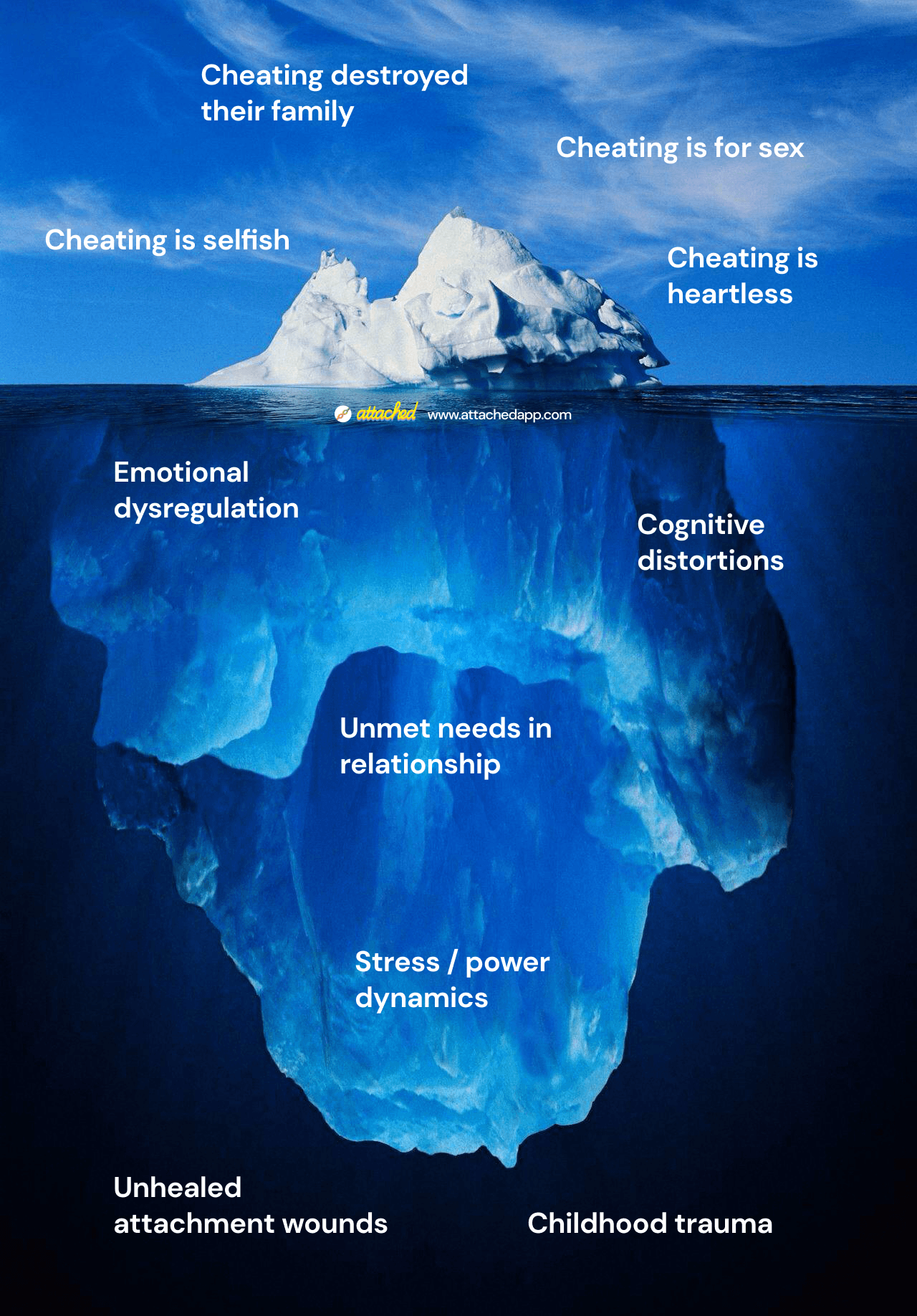
What Attachment Styles Reveal About Why People Cheat
According to research, insecurely attached people cheat more often. In fact, a 2020 meta-analysis found that anxious and avoidant attachment styles are strongly linked to infidelity (Weiser et al., Journal of Social and Personal Relationships).
Attachment theory explains how our early childhood relationships shape how we behave in love. When it comes to cheating:
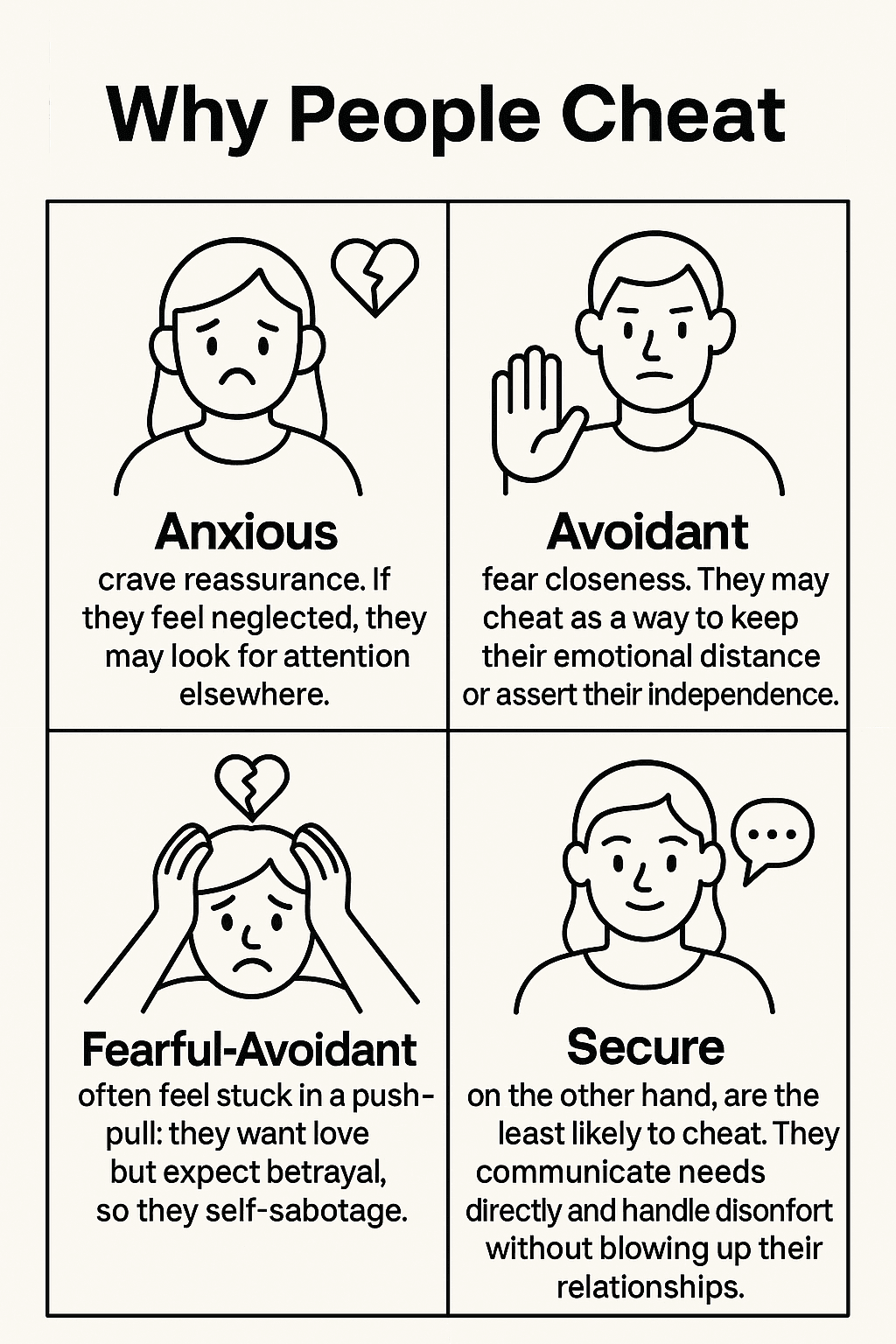
- Anxious types crave reassurance. If they feel neglected, they may look for attention elsewhere. Just to prove they're still wanted.
- Avoidant types fear closeness. They may cheat as a way to keep their emotional distance or assert their independence.
- Fearful-avoidant types (a mix of the two) often feel stuck in a push-pull: they want love but expect betrayal, so they self-sabotage.
- Secure types, on the other hand, are the least likely to cheat. They communicate needs directly and handle discomfort without blowing up their relationships.
Why Affairs Happen More Often in High-Stress Work Environments (Psychologically Speaking)
In the workplace, where stress runs high and boundaries blur, people with unhealed attachment wounds are more likely to slip. Especially when power dynamics and secrecy are in play, like a CEO and his HR chief.
Reason 1. Attachment Wounds Get Activated Under Stress
Workplaces, especially high-pressure ones, often mirror early family dynamics: authority figures, competition for approval, fear of failure. For people with insecure attachment styles, this triggers old coping strategies:
- Anxious types may seek validation from authority figures or peers when they feel unseen or insecure.
- Avoidant types may detach emotionally but engage in risky behavior (like flirtation) to maintain control or autonomy.
Reason 2. Power Dynamics Lower Inhibition
When one person has more power (e.g., a CEO over an HR chief), it distorts consent and risk assessment. Research in social psychology shows that power can:
- Increase impulsivity and entitlement
- Decrease empathy and perspective-taking
- Create illusion of invincibility
Reason 3. Attachment Trauma Seeks Reenactment
People with unhealed attachment wounds often recreate early relationship patterns in adult life, subconsciously seeking resolution or control.
- Anxious types may be drawn to emotionally unavailable bosses or mentors, replaying childhood abandonment.
- Avoidant types may engage in affairs as a way to assert dominance or protect themselves from intimacy.
Cheating Doesn't Just End a Marriage. It Reshapes a Childhood.
When cheating leads to divorce, the fallout often hits children the hardest.

Children of divorced parents are 2x as likely to get divorced themselves
1. 69% of children from high-conflict divorces develop insecure attachment styles
These children are more likely to become anxious, avoidant, or fearful in adult relationships (Amato & Booth, 1997). They may constantly fear being abandoned or emotionally smothered.
2. Children of divorced parents are 2x as likely to get divorced themselves
Not because they don't believe in love, but because they never saw what healthy conflict, repair, or emotional safety looked like (Wolfinger, 2005). They'll repeat the cycle that their parents created.
3. Daughters of unfaithful fathers are more likely to enter toxic relationships
Studies show they are more likely to tolerate emotional neglect or infidelity themselves, linking love with inconsistency or pain (Vasquez & Haney, 2010).
4. Children of divorce have 2x the rate of anxiety and depression in adulthood
Especially when the split involved betrayal or conflict without emotional support. Many grow up waiting for the other shoe to drop, never fully feeling safe in love (Strohschein, 2005).
5. Lower executive function = poorer academic and career performance
- Chronic stress from parental conflict and betrayal disrupts brain development, especially in the prefrontal cortex (which governs focus, planning, and decision-making).
- Kids from high-conflict divorces show lower SAT scores and academic achievement (Wadsby et al., 1996). This can snowball into reduced access to elite schools, jobs, and long-term career capital.
6. Distracted by unresolved emotional cycles = stalled progress
- Adults carrying unresolved trauma often struggle to stay regulated under pressure.
- They may spiral during conflict, avoid difficult conversations, jump jobs or industries to escape internal discomfort, creating career instability, despite intelligence or talent.
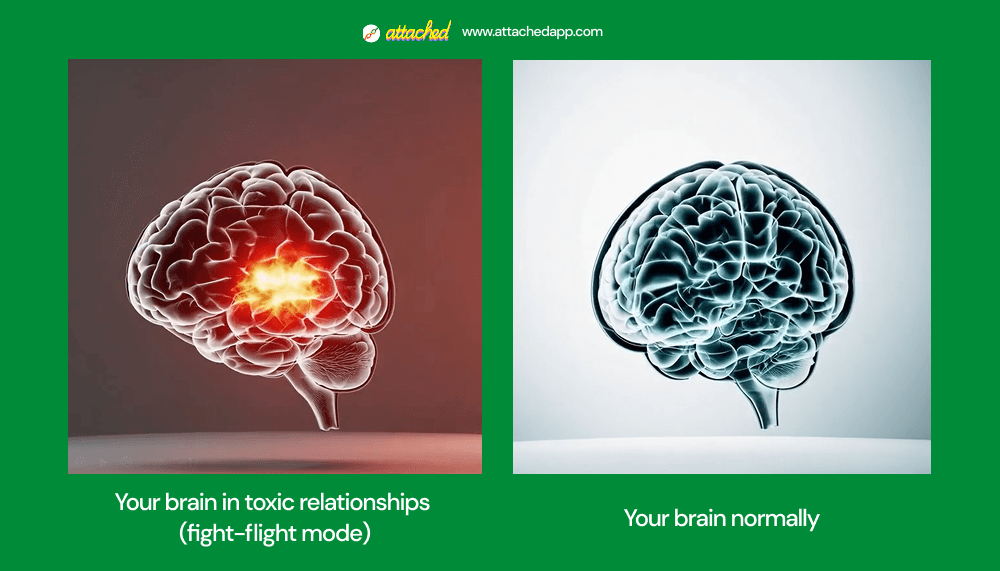
What You Can Do to Protect Your Relationship
"Nobody said it was easy"
This isn't just about tech CEOs. It's about you, your partner, and your kids.
Here's what to do if you want to guard against infidelity:
- Learn your attachment style. Self-awareness is step one. (The Attached app has a great quiz, downloadto try for free)
- Speak your needs. Don't wait until you're resentful.
- Set clear boundaries. Define what counts as betrayal: emotional DMs, work "friendships," etc.
- Stay curious. If you feel drawn to someone else, ask: What am I really looking for?
This scandal shocked the internet. But what's truly tragic is how few people understand the real reason behind it. As a society, we collectively lack an understanding of our emotional needs and wounds.
When emotional needs go unmet and attachment wounds go unhealed, people will always find ways to fill the void, even if it means blowing up their lives.
Once A Cheater, Never A Cheater Again After the Attached App
"Lights will guide you home. And ignore your bones. And I will try to fix you."
We were never taught how to handle heartbreak, triggers, or emotional pain. Yet these moments shape our lives more than anything else. Attached helps you finally understand and heal the emotional patterns beneath anxiety, conflict, and insecurity.
Attached was created by founders who grew up as children of separated/divorced parents. After going through a long and painful childhood, they saw how impactful parental dynamics have on children and their future.
If you're the one being unfaithful in your marriage, if you've been cheated on, or if you're a child of parents who separated:
Download Attached for free now
"When you lose something you can't replace. When you love someone and it goes to waste. Could it be worst?"
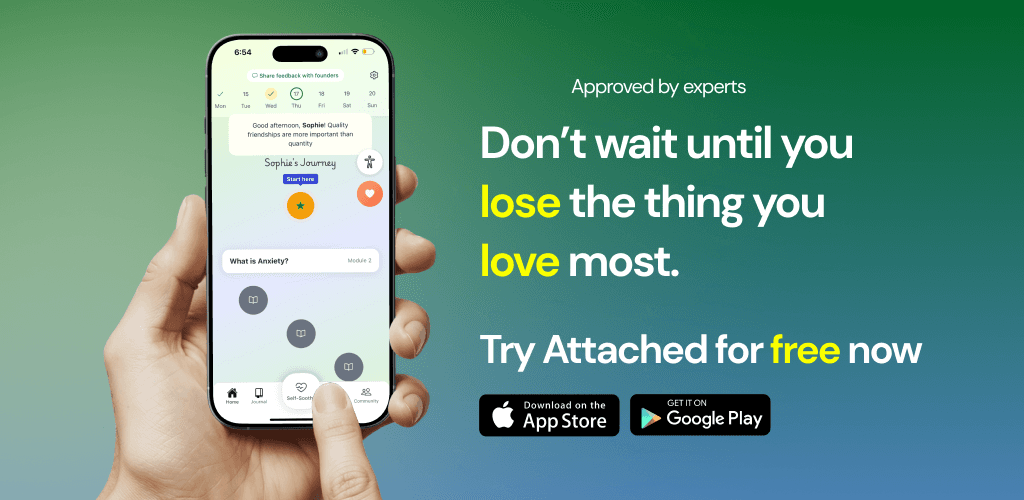
Attached is the No.1 relationship science app backed with attachment science
The Attached app helps you heal your emotional wounds and stay attuned to your needs with:
- Daily Quests for habit-building
- Help Mode for tough emotional moments
- A Journal That Talks Back to find hidden emotional patterns
- Weekly Coaching from Eden, your relationship guide
Download Attached for free and start by healing the parts of you that still feel unsafe in love.
Sources:
- Amato, P. R., & Booth, A. (1997). A Generation at Risk: Growing Up in an Era of Family Upheaval
- Wolfinger, N. H. (2005). Understanding the Divorce Cycle: The Children of Divorce in Their Own Marriages
- Lupien, S. J., et al. (2009). Effects of stress throughout the lifespan on the brain, behaviour and cognition.
- Vasquez, E. A., & Haney, C. (2010). Parent–child relationships and intimate partner violence.
- Strohschein, L. (2005). Parental divorce and child mental health trajectories.
- Fagan, P., & Churchill, A. (2012). The Effects of Divorce on Children.
- Richards, D. A., & Schat, A. C. H. (2011). Attachment at (Not to) Work: Applying Attachment Theory to Explain Individual Behavior in Organizations.
- Wadsby, M. et al. (1996). Children of Divorce: Psychosocial Development and Academic Achievement.
- Bartholomew, K., & Horowitz, L. M. (1991). Attachment styles among young adults: A test of a four-category model.
- Weiser, D. A., Weigel, D. J., Lalasz, C. B., & Evans, W. P. (2020). A meta-analysis of attachment and infidelity. Journal of Social and Personal Relationships, 37(4), 1200–1225. https://doi.org/10.1177/0265407519886350
- DeWall, C. N., Lambert, N. M., Slotter, E. B., Pond, R. S., Jr., Deckman, T., Finkel, E. J., & Fincham, F. D. (2011). So far away from one's partner, yet so close to romantic alternatives. Journal of Personality and Social Psychology, 101(6), 1302–1316. https://doi.org/10.1037/a0025011
- Lehmiller, J. J. (2014). The ties that bind: The impact of social network structure on romantic and sexual development. Journal of Sex Research, 51(3), 242–253. https://doi.org/10.1080/00224499.2012.716874
- Takiguchi, S., Takahashi, H., Nishikawa, Y., & Tanabe, H. C. (2019). Brain activity in betrayal: The neural substrate of moral injury and PTSD. Frontiers in Psychology, 10, 2224. https://doi.org/10.3389/fpsyg.2019.02224
- Glass, S. P., & Wright, T. L. (1992). Justifications for extramarital relationships: The association between attitudes, behaviors, and gender. Journal of Sex Research, 29(3), 361–387.
- Fisher, H. E. (2004). Why We Love: The Nature and Chemistry of Romantic Love.
- Barta, W. D., & Kiene, S. M. (2005). Motivations for infidelity in heterosexual dating couples: The roles of gender, personality differences, and social norms. Journal of Sex Research, 42(4), 313–321.
- Brewer, G., & Abell, L. (2015). Machiavellianism and infidelity in dating couples. Personality and Individual Differences, 72, 145–150.
- Jones, D. N., & Paulhus, D. L. (2011). The dark triad of personality: Narcissism, Machiavellianism, and psychopathy.
